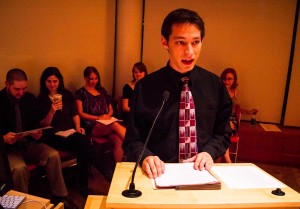By Geo Gomez
gomezgeo@grinnell.edu
In the summer of 2012, six honorable Grinnellians took up the arduous task of translating Beowulf, the classic Old English epic poem, into modern English for their Mentor Advanced Projects (MAP). The fellowship consisted of six brave souls: Logan Shearer ’13.5, Eva Dawson ’14, Emily Johnson ’14, Jeanette Miller ’14, Aniela Wendt ’14 and Kate Whitman ’14. Under the tutelage of Tim Arner, hailed sage of Medieval Literature, the six spent the summer translating and contemplating the text, until a tome of brilliance was wrought from their hard work.

Tuesday evening, five of the six students—Wendt is currently abroad—presented their work to the public in JRC 101 by reading passages from their translation. Taking the audience through their abridged, modern-language version of the famous Old English epic poem, the five, with the help of Arner reading for Wendt, wove the epic tale of Beowulf, legendary hero of Geats.
The lecture itself involved the painstaking process of translation. During their presentation, the group showed a spreadsheet, detailing their process.
They explained how they broke into pairs and found a translation for each word in every line and wrote a literal translation of the line with no changes to the syntax and structure of the sentence.
Then, as a group, they went over the literal translations and consulted each other on how they would construct Modern English lines that would carry the same meaning as the Old English.
This was not an easy task by any means—so what inspired this humble group of English majors to rise to the occasion? The group had a variety of motivations, including their inherent love for Beowulf and desire to occupy themselves during the summer. Permeating all of their work is an appreciation for literature, its intent and its form of expression.
“I wanted to take a work in a foreign language and translate it, but still capture its poetics and beauty,” Miller said.
A poem in its native language works with certain constraints and elements to express an idea in a beautiful manner. To retain the poeticism and unique eloquence of the poem in translation was a task in literary appreciation and close reading.
Through undertaking the challenge of translating Beowulf, the group developed their literary skills in a unique way they might not otherwise have been able to.
“My skills in close reading have drastically improved through this project,” Shearer said, “You have to think about the smallest little details in order to understand what effect the text has.”
The intimate work of the translation required the students to examine every single word of Beowulf and fully comprehend its meaning. As a group, they had to cooperate, piece their understandings together and come to a consensus on their final translation.
“I learned to deliberate on every single decision that was made with my group so that the final work reflected everyone’s input,” Dawson said.
Students wholly immersed themselves in the world of Old English and poetics, day in and day out.
“My mind was a constant wash of synonyms,” Whitman said.
There were times when the group was exhausted with their painstaking engagement with the text. Like any good group of heroes, however, they managed to pull through those dark times to continue their work.
“With any other group of students, it just wouldn’t have gotten to the point where there was something worth holding onto and working towards,” Arner said, “The group’s dedication was a big part of what kept me going.”
Tuesday evening’s reading showed their translation as effective and accurate, as well as moving. As the group described the nefarious Grendel’s terror, the audience trembled in fear. When Beowulf defeated his foe after a ferocious battle, faces grew exultant at the Geatish hero’s triumph.
The epic poem survived thousands of years of history and finally has withstood its most trying test—a Grinnellian translation into modern English. The Grinnell Beowulf allows the ancient epic to continue to thrill and enchant audiences.



















































Becky Yoose • Feb 17, 2015 at 3:30 pm
Hi Frances,
You can access a copy of the Grinnell Beowulf at http://hdl.handle.net/11084/5317.
FRANCES HOLLAND SCHWARTZ • Feb 9, 2015 at 8:42 pm
Is it possible to get a copy of this Beowulf? If so, how?